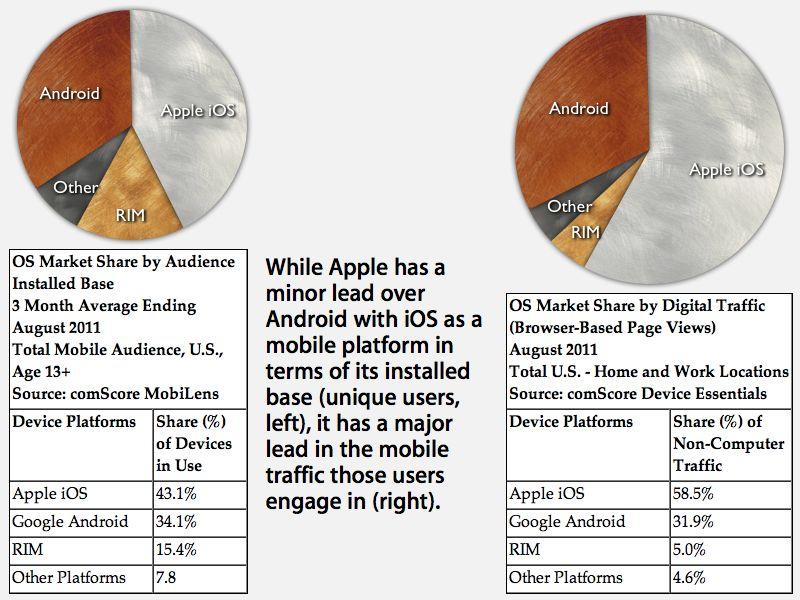iPad now 97% of tablet traffic, eclipses iPhone, iOS remains mobile leader
The growth of mobile devices has claimed a 6.8 percent chunk of US web traffic from conventional PCs, according to a new report by comScore.
Of that segment, about two thirds of the traffic is from mobile phones and a remaining third is being generated by tablet users. The group notes that Apple's iPad now accounts for 97.2 percent of all tablet-originating web traffic, driving home the reality that competitors have not yet released a significant tablet competitor.
Among iOS users, iPad now accounts for 46.8 percent of all traffic generated, making it now a more prolific tool than the iPhone for mobile web use, which represents 42.6 percent of iOS traffic.
An increasingly important market segment
The firm also outlined why the growth of tablet traffic is significant, noting that almost half of tablet owners have completed purchases using their tablet.
"Tablet owners exhibited significant use of their devices throughout the entire online shopping process," comScore reported, "from doing the initial planning, conducting product and store research, making price comparisons, to finally transacting. In the past month, more than half of tablet owners looked up product or price information for a specific store (56 percent) and read customer ratings and reviews while on a tablet (54 percent)."
The group added, "the incremental reach through mobile and connected devices should not be underestimated," pointing out that, "in August 2011, the additional mobile and connected device audience for Pandora accounted for more than half of their total cross-platform audience."
Who rules the mobile world? Girls! No iOS
"Although the Android platform accounts for the highest share of the smartphone market (43.7 percent in August)," comScore stated, "its total audience among mobile and connected devices in current use is eclipsed by the Apple iOS audience.
"The iOS platform had the highest share of connected devices and smartphones in use at 43.1 percent, fueled by the iPad’s dominance in the tablet market, while Android accounted for 34.1 percent of the total mobile and connected device universe."
While Apple has a minor lead over Android with iOS as a mobile platform in terms of its installed base (unique users), it has a major lead in the mobile traffic those users engage in.
"When measuring market share of Internet traffic by platform," comScore explained, "iOS accounted for more than half (58.5 percent) of the share of total non-computer traffic in the U.S. Android OS ranked second, delivering 31.9 percent of overall non-computer traffic in August. With iOS having a significantly higher share of traffic (58.5 percent) compared to its share of devices (43.1 percent), it suggests that iOS users are heavier-than-average consumers of Internet content."
It has been speculated that the huge divergence between Android's popularity (sales of Android-based phones have outnumbered iPhone sales most of this year) and its minority presence in web analytics is due to the fact that the majority of low end devices now use Android, including basic models that work like feature phones. That results in impressive sales figures for Android as a platform, but does not translate into a comparably important software platform for apps, nor an equally important market demographic.
That reality has helps make it clear why the supposed "avalanche" of new Android tablets failed to materialize as a real challenger to the iPad over the past year, just as Steve Jobs had predicted last October.
Unlike mobile phones, which existed as a major market long before the iPhone, tablets have never taken off prior to the release of iPad, making the new device a market unto itself much like the iPod had been. Apple's music player has not been significantly challenged in sales by any competitor over the past decade.
If Apple can maintain a similar competitive lead with the iPad over the next decade, it will not only maintain dominance over mobile devices and the App Store software that runs on them, but also continue to eat up the market currently held by conventional computers on one end while its own conventional computers vie for market share within that market itself.
 Daniel Eran Dilger
Daniel Eran Dilger











 Mike Wuerthele
Mike Wuerthele
 Malcolm Owen
Malcolm Owen
 Chip Loder
Chip Loder

 William Gallagher
William Gallagher
 Christine McKee
Christine McKee
 Michael Stroup
Michael Stroup
 William Gallagher and Mike Wuerthele
William Gallagher and Mike Wuerthele






